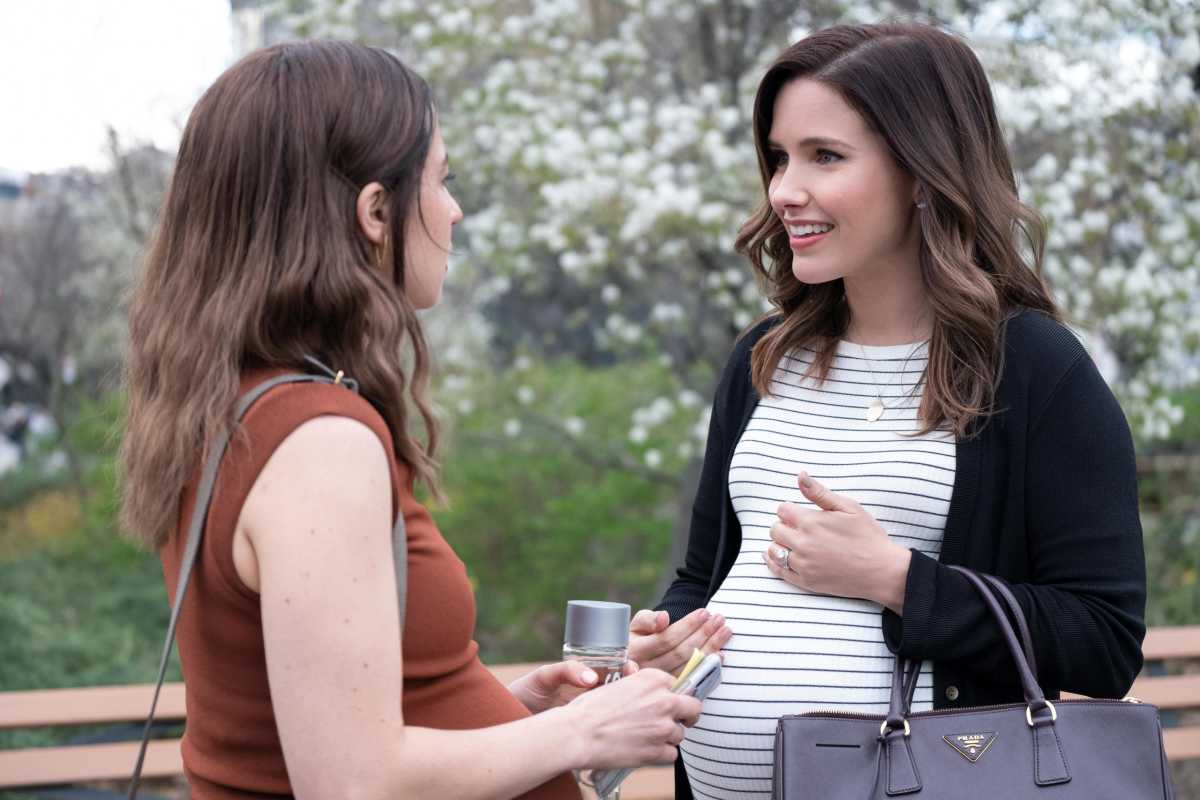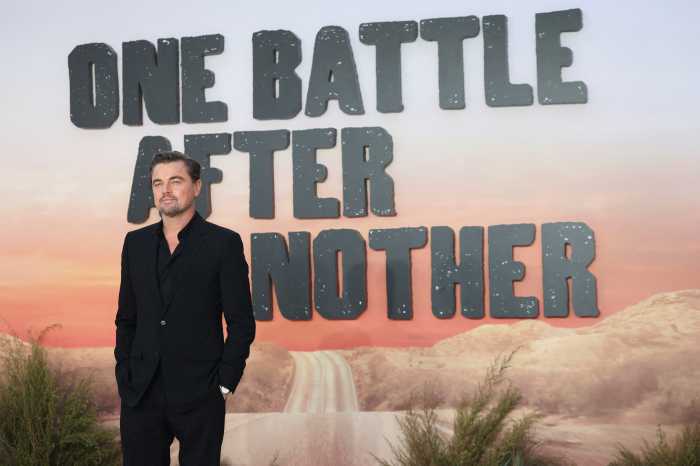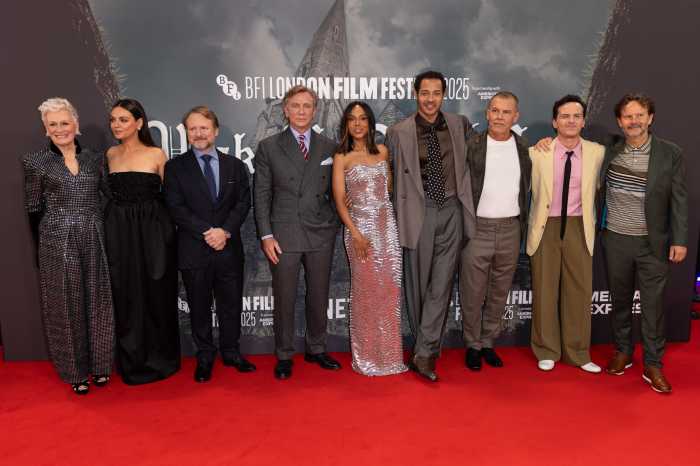Pregnancy is known as one of the most joyous time in a woman’s life, but there are darker undertones that sometimes are overshadowed or diminished—at least that’s what Ilana Glazer and John Lee are looking to highlight in Hulu’s latest original film, ‘False Positive.’ The actress and director created the story along with author Alissa Nutting to show the more insidious side of pregnancy, one where a woman’s reproductive parts are used more for real estate and gain than the chance to grow a life out of love.
Glazer plays Lucy, a marketing executive living in New York City along with her husband, Adrian (Justin Theroux), and although the couple was having some trouble to conceive, Adrian’s connections in the medical field allow them to be at the top of the list for a glossy, prestigious and almost unnerving fertility clinic run by one of Adrian’s old colleagues (Pierce Brosnan.) It’s there where Lucy begins to realize that her pregnancy is in a way being hijacked by those around her, and when she voices her concerns, she is repeatedly met with “you’re not thinking clearly,” or a term used quite frequently throughout the film, “you just have mommy brain.” One of those disenfranchisers is her own friend, Corgan played by Sophia Bush. Throughout her time with her friend, it’s repeated over and over that Lucy is no longer in control of her own opinions—yet it’s hidden by a smile and signs of concern, just no where near the way Lucy really needs help.
Bush sat down to discuss why she wanted to sign on with ‘False Positive’ and what her character represents in this horror film with twists and turns that show the realities of a horrific situation for women not just in the country, but also around the world.
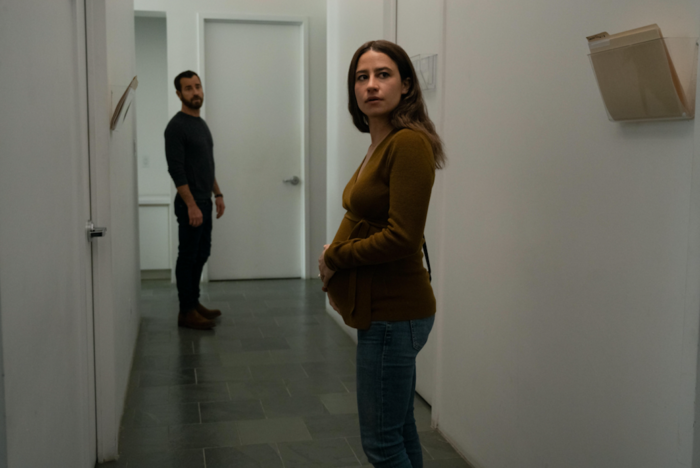
What was the initial draw for you to want to sign on with this project?
The initial draw for me was when I had my first conversation with Ilana. She reached out to me and said, ‘Hey, I wrote this really dark film—and I thought, you? My comedy queen?—and said I would really love for you to come and work with me [on this.]’ We started talking about the scenes in the movie and what the characters represented in terms larger moments occurring in society right now that she’s learning and I’m learning. This real battle that is shockingly still going on. I felt incredibly inspired about the potential of it, and she passed the script along and sent me a couple of articles to reference. It was just so deeply disturbing to read about how many women in how many states around the country have had this experience with the doctors who they trusted most… and I was 100% in.
Through these conversations with Ilana, what did you chat about in terms of what your character was a representation of?
Corgan to me is a representation of that kind of deeply, dangerous internalized misogyny that makes everyone sick. It’s dangerous to the person who has essentially been drinking this toxic tea their whole life and to the friends around them. Truly we all understand with this larger learning and unlearning in society that misogynistic systems and racist systems and patriarchal systems—they don’t actually benefit anyone, including those who they were designed by. They create various engines in terms of where most of the power is held, but people in power are actually haunted by these systems as well as everyone else.
That to me is a really interesting thing to reflect as a woman, who in her explanation is a great friend, and is incredibly empowered. She explains all the ways that she’s had agency and choice in her life and doesn’t even see that her first instinct with herself and with her friends when an issue is brought up is to immediately say, ‘Well what does your husband think?’ So, she doesn’t deserve to have an opinion on her experience, particularly on being pregnant and she mirrors that dangerously to Lucy consistently asking what does Adrian think? Then even at times saying, ‘I’m worried about you and your mental state and I think we should see what your husband’s opinion is’ … It’s so disenfranchising. It’s such a way to erase someone’s experience and it’s very unsettling to watch Corgan do it to Lucy, and to me, it was deeply unsettling and uncomfortable to play her knowing that this character had done this to herself for her whole life.
With those scenes between Corgan and Lucy where she is essentially disenfranchising and gaslighting her friend… did you try to keep anything in mind while filming?
It was deeply uncomfortable. Ilana and I would get to a point where we would cut on a set-up because you’re doing take after take of something and then when the camera needs to be moved you have a moment… we would jump up and literally start shaking out our hands and shaking out our faces. It felt so awful and insidious to talk to each other this way. I will say what a relief to do [this] with Ilana, because she’s just the funniest human being. While she’s playing this serious character, we would jump around the set screaming and yelling and just moving our bodies around and just be hysterically laughing, and we needed those moments, because otherwise I think that I would have gone home with a migraine everyday just from the tension and discomfort of sitting in these places.
For me, while we did it, I constantly had to think of what state you would have to be in and what you would not have had learned from the world in yourself to be this person who I was playing. I had to create a lot of really uncomfortable thoughts to have kind of at my disposal when Ilana and I were in character. I did not like that particular bag of tricks that I had to create.
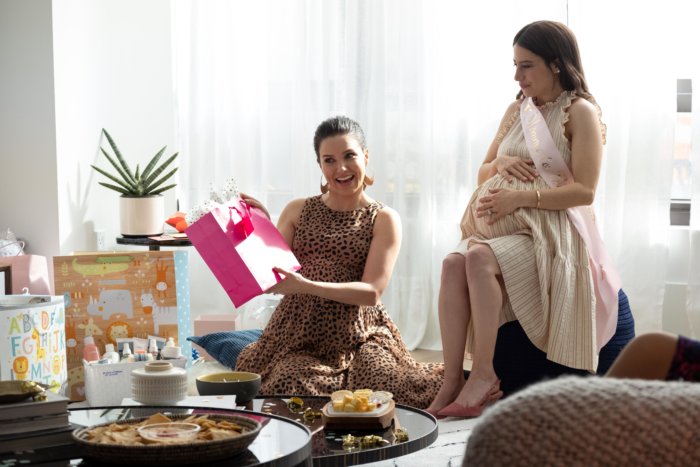
How would you describe this film?
Some of the best descriptions that we’ve heard so far: People have said it it feels like ‘Rosemary’s Baby’ meets ‘Get Out,’ which I think is so wise. There’s a classic psychological/horror aspect to it and there’s also a societal commentary in the same way that I think that was examining systematic racism and harm, where this is examining systematic misogyny and harm.
Also, the realities of childbirth that we hide from so many people—the way that we literally deny these experiences. It was so surreal for me, going from this movie to starting to work on my series and doing so much study about the heart and learning the number one cause of an aortic dissection in women under 40 is pregnancy. It is literally the most life-threatening thing a woman will ever go through, and everyone acts like it’s just flowers and candy.
It should be joyous and it should be celebrated, but it should also be revered as a deeply serious experience and so much of that is removed from the narrative for women. So, it sounds like a really important conversation to have also packaged in a really deliciously fun horror film, because horror films are so gross and uncomfortable, but for some reason we love them. I think that there’s something very classic and also something very new in the energy with this movie and I think Ilana and John Lee were able to brilliantly cultivate in the writing and also in the way that he directed the film.
‘False Positive’ drops on Hulu June 25.



